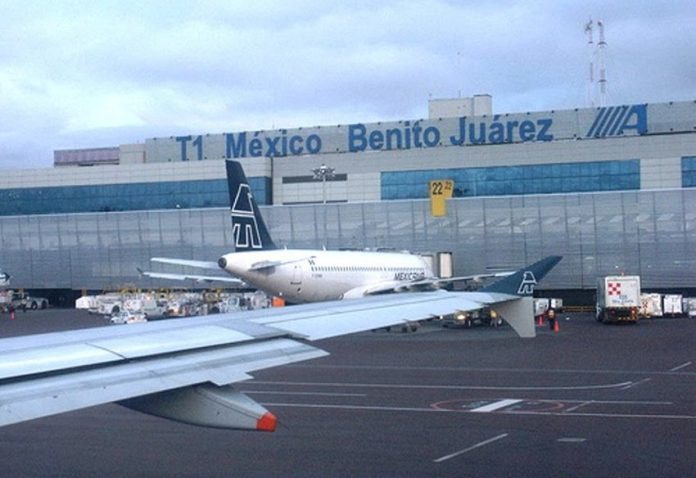A day before the public consultation on the future of the new Mexico City International Airport (NAICM) begins, there are signs of growing concern over the negative economic impact a decision to cancel the project might have.
Mexico’s two largest banks, BBVA Bancomer and Citibanamex, agree that if the incoming government decides to scrap the US $15-billion airport, it will hurt private investment.
“From a fiscal point of view, cancellation of the NAICM shouldn’t, in itself, imply a lower credit rating. It all depends on the details of the cancellation or new agreement but [lower] confidence in upcoming investment projects could have a negative impact on local assets,” Bancomer said in a research document.
According to Citibanamex, canceling the project would impact negatively on investment because it would reinforce an already common view about the way the new government is likely to make decisions.
“The perception in the market that the AMLO [Andrés Manuel López Obrador] administration will take public decisions in a discretional and populist way will intensify,” the bank said in a note sent to customers.
“Into the future, private investment would face a more uncertain economic and legal environment.”
Citibanamex economist Sergio Luna told the newspaper El Financiero that scrapping the airport project could lead rating agencies to downgrade Mexico’s credit rating — not because of doubt surrounding its capacity to pay “but rather the will.”
“The first thing the rating agencies would do would be to place a negative outlook on the country’s rating,” Luna said.
“Decision-making would be seen as more discretional and that would be taken into account once the new government takes office,” he added.
Consultancy Miranda Partners sees the decision as a test of the new administration. “This is a test of how sensible this incoming government is and if they cancel they’re failing it,” director Damian Fraser said.
Benito Barber, chief economist in Latin America for French investment bank Natixis, said that cancellation of the airport would generate “an increase in risk premiums for short-term [government] bonds and credit default swaps.”
He added that “there would also be an impact on the budget depending on how much would have to be paid for the cancellation.”
Incoming transportation secretary Javier Jiménez Espriú said last week that canceling the project would result in a loss of 100 billion pesos (US $5.1 billion).
Today, he said that both continuing with the NAICM and the alternative — adapting México state’s Santa Lucía Air Force Base for commercial aviation — are viable. But the president of BIVA, Mexico’s new stock exchange, believes that from an economic standpoint, the best choice is clear.
“If Santa Lucía wins, it would be a game-changer that the economy would find a little bit difficult to assimilate. It would be something that I would prefer not to imagine . . .” Santiago Urquiza said.
Gustavo de Hoyos, president of the Mexican Employers Federation (Coparmex), said that a decision to cancel the project has the potential to impact on both the domestic and the international private sector’s confidence in the Mexican economy.
The future of other large infrastructure projects that the new government plans to undertake could be placed at risk.
“What’s at stake is much more than the airport, the rationality of political management in this country is at stake,” he said.
De Hoyos also said that he was concerned about whether the result of the consultation, which will take the form of a referendum, will truly be representative of the will of the people.
The vote will be held in 538 municipalities across Mexico between October 25 and 28 and citizens will be presented with a ballot asking the question: “Given the saturation at the Mexico City International Airport which option do you think is better for the country? (a) recondition the existing airport and that in Toluca and build two runways at the Santa Lucía Air Force Base; (b) continue with the construction of the new airport in Texcoco and discontinue using the existing Mexico City International Airport.”
According to a poll by El Financiero, the ballot’s wording might have an effect on the outcome. Conducted October 18-20, the poll found that 55% favored continuing with building the airport in Texcoco.
But when the survey asked the question using the same wording as the ballot, the results were reversed.
The first option, which would cancel Texcoco, was the more popular with 53% in favor.
Another factor that might influence the outcome is the selection of polling stations. They will be concentrated in regions where the soon-to-be ruling Morena party has newly-won strongholds, an analysis of the incoming government’s consultation plan showed.
López Obrador has said that the result will be binding, although legally speaking the incoming government will not be bound by it.
American economist Robert Shiller, who won the 2013 Nobel Prize in Economics, said during a visit to Mexico yesterday that before making any decision on the airport’s future, the López Obrador-led government should carefully consider the importance of Mexico being seen as a safe country in which to invest.
“. . . I don’t know whether he is right or not but I hope that his decision isn’t an impetuous one like some of those of [U.S. President] Donald Trump . . . It’s important that the new president encourages investors so that they feel that [Mexico] is a safe environment [in which to invest],” he said.
Source: El Financiero (sp), Milenio (sp), Financial Times (en)
